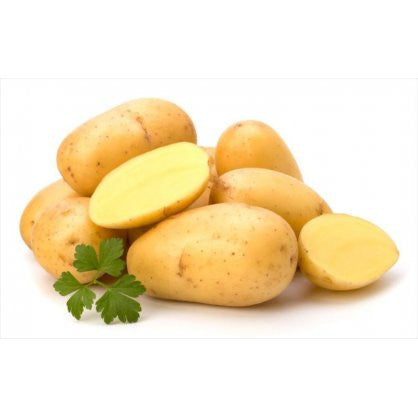Περιγραφή
Potato, also known as potato, is a starchy vegetable with great nutritional value. It is widespread in Greece but also worldwide and is used as a staple food. Its great popularity is due to the fact that it can be consumed in a variety of ways, such as boiled, baked, fried, gratin, sauteed, soup, and therefore it is often considered a convenience food. The advantage of the potato over other vegetables is that it combines the characteristics of starchy foods with those of other vegetables.
History
The history of the potato begins in South America (Mexico, Peru, Chile and Colombia) from where it was brought to Europe and specifically to Spain. It came to Greece in 1833 by Ioannis Kapodistrias and was a very important food during the world wars. Today, the largest potato producing countries in Europe are Germany, Russia and Poland.
Nutritional value
The nutritional value of the potato is important but it is greatly influenced by the way it is prepared but also by the conditions and duration of its preservation. The potato consists of 78-80% water, 18-20% starch, 1.5-2% proteins and 1% vitamins and trace elements. The dominant nutrient in the potato is carbohydrates, in the form of starch. Carbohydrates provide the body with energy for its physical activities and help maintain body temperature at normal levels. As far as proteins are concerned, although they are present in a small percentage in the potato, if it is properly combined with foods rich in protein (such as egg, cheese, meat, etc.), it can yield protein of high biological value.
Proteins, in turn, help in the growth and regeneration of the body's tissues, but also in strengthening the body's defenses. Fat is found in trace amounts in the potato. In summary, we could say that a 100 gram potato contains 17.7 g of carbohydrates, 2.1 g of protein and 0.1 g of fat.
Another very important component of the potato is its vegetable or dietary fiber. Fiber is mainly found in the skin of fruits and vegetables and the same is true for potatoes. Therefore, in order to obtain the beneficial properties of the vegetable fibers in potatoes, it is advisable to consume them with the skin. But before consuming them, we should clean them thoroughly and remove the damaged parts of its outer surface. A medium-sized potato of 100g contains 1.6g of fiber which covers about 15% of the recommended daily amount (25g). Fiber helps control weight, as it makes you feel full more quickly. Moderate consumption of potatoes can therefore be an excellent choice for people who want to lose weight. Also, the plant fibers have a positive effect on the regulation of blood sugar, on the reduction of cholesterol and on the proper functioning of the digestive system.
Potatoes contain more potassium than any other fresh vegetable and fruit. A medium-sized potato contains 900 mg of potassium, covering about 20% of the recommended daily amount of potassium. Potassium is a valuable trace element that helps the body grow and maintain cells. It is useful for athletes, because it helps oxygenate the body and the good functioning of the heart and muscles. In addition, it is an electrolyte, which helps balance the body's fluids, which is important for healthy blood pressure.
Vitamin C, as well as B complex vitamins (niacin, pyridoxine riboflavin, thiamin and folic acid) are present in high concentrations in potatoes. Regarding vitamin C, a medium-sized potato (100gr) contains 20mg of vitamin C, which covers approximately 50% of the necessary daily amount. This particular vitamin is necessary for a strong immune system, and at the same time contributes to the better absorption of iron by the body. Therefore, people who have iron deficiency anemia could have the potato more often in their diet. Of the B vitamins, B6 (pyridoxine) is the predominant one.
B6 helps in the metabolism of carbohydrates and proteins, but also in regulating the action of cholesterol. Also, the folic acid contained in the potato is necessary for cell growth and is considered essential during pregnancy.
In recent years, more and more people are suffering from celiac disease, a disease characterized by gluten intolerance. Gluten is a protein found in foods containing wheat, barley and rye. These people should not consume staple foods such as pasta, cereals and bread. Potatoes could be an excellent choice in this case, because they do not contain gluten and can be eaten without fear.
In conclusion, the potato is a nutrient-dense food. However, in order to be able to benefit from its valuable ingredients, certain conditions must be met to preserve its trace elements and vitamins, such as:
1. It should be stored in a dark and cool place, since the sun causes the potato to turn green due to a toxic substance that develops called solanine.
2. It is best not to store it for a long time because it loses 50% of the vitamin C it contains.
3. When the potato is boiled with its skin, it retains a greater amount of vitamin C, B vitamins and potassium than otherwise.
4. Finally, by boiling the potato, vitamin C and B complex vitamins, because they are water-soluble, dissolve in the water we boil. We should use exactly as much water as is needed, to have the least possible losses.


